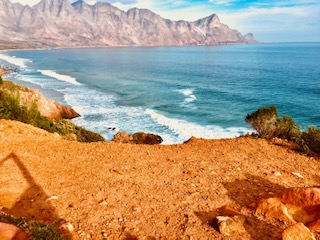by Dr. Judith Mayotte
Greetings Pilgrims,
Although we are not embarking on the August 2020 Pilgrimage we had planned, opportunity always knocks at our doors, and we are eager to offer you the opportunity to meander along the paths of a very special “at home” pilgrimage this year as we continue to protect ourselves, our neighbors, and our loved ones from the coronavirus.

No matter where I am, I always stand in awe of the beauty of this Earth home of ours. Whether I am traversing through some of Earth’s highest mountain peaks in Pakistan, or watching the ancient ritual of a giant leatherback turtle emerge from the Indian Ocean onto a darkened Mozambican beach to lay and bury her eggs, or gazing on the tiny glacial lilies on the slopes of our own Mount Rainier, I sing a song of thanks for the diverse beauty of creation in the words of poet Gerard Manley Hopkins: “The world is charged with the grandeur of God.”
God’s Grandeur
By Gerald Manley Hopkins (1985)The world is charged with the grandeur of God.
It will flame out, like shining from shook foil;
It gathers to a greatness, like the ooze of oil
Crushed. Why do men then now not reck his rod?
Generations have trod, have trod, have trod;
And all is seared with trade; bleared, smeared with toil;
And wears man’s smudge and shares man’s smell: the soil
Is bare now, nor can foot feel, being shod.And for all this, nature is never spent;
There lives the dearest freshness deep down things;
And though the last lights off the black West went
Oh, morning, at the brown brink eastward, springs —
Because the Holy Ghost over the bent
World broods with warm breast and with ah! bright wings.
My current interest in how we care for our Earth home came about because of my work among refugees and internally displaced civilians in refugee camps and war zones in many parts of our world: Thailand, Cambodia, Sudan, South Sudan, Eritrea, Pakistan, Afghanistan, and Bosnia to name a few. During this time, many of us who worked with and on behalf of refugees became aware that in future years, people would be displaced not only because of persecution and conflict, but also because of the increasing frequency and force of extreme weather events. Beyond the more than 78 million refugees and internally displaced civilians in our world today, millions more are already enduring climate displacement. Some are even losing their towns and villages from the melting of the permafrost, which causes land erosion. As a result of melting permafrost, some Native American villages in our own Alaska are beginning to tumble into the sea.

While I can no longer climb peaks or walk on rugged terrain due to the fact that I am in a wheelchair, I can still roll along smoother surfaces and gaze on those glacial lilies on lower areas of Mount Rainier. I can glance out my windows, go to the garden, roll my wheelchair along city paths around Green Lake and so many other places where the beauty of God’s creation brings delight.
There are so many ways in which you can bring your pilgrimage reflections and actions alive. You can journal; write a poem, song, short story, or prayer; or record a podcast or film. You can do a day or more of service. You can make a habit of doing little things like turning out lights when you leave a room, turning off the water when you brush your teeth, composting your garbage, and recycling. You can simplify your life. Ride your bike more, be a smarter and more efficient consumer, buy locally, plant a vegetable garden either in your yard or in a shared neighborhood space.
 Dr. Judith Mayotte is a humanitarian, author, theolo
Dr. Judith Mayotte is a humanitarian, author, theolo
